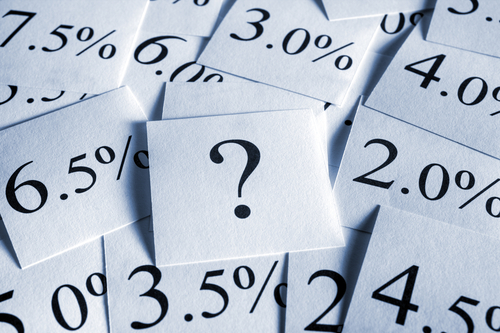Editor's Pick
What will a base rate rise mean for savers, borrowers and retirees?

For the first time in years, there seems to be some certainty surrounding interest rates. Bank of England governor Mark Carney has said the base rate could rise from 0.5% – where it has been stubbornly stuck since 2009 – by as early as December.
We look at what a base rate rise would mean for savers, borrowers and retirees.
Savers
According to the Financial Conduct Authority (FCA), around £160bn currently sits in easy access savings accounts paying 0.5% or less.
An interest rate rise would surely be welcome news for Britons who have suffered poor returns over the past six years. However, savers shouldn’t get too excited.
“In theory, savers should benefit from a base rate rise through higher interest rates on their savings,” says Eesha Mohindra, money analyst at MoneySavingExpert.com.
“However, whether or not banks and building societies will pass this on to savers is questionable.”
Savers could be disappointed when the base rate rises, according to Susan Hannums, director of SavingsChampion.co.uk, as the traditional link between savings rates and the base rate has long been non-existent, and won’t necessarily be reinstated.
She believes savers should ignore the rise altogether, and focus instead on the current market.
“Increased competition among a small selection of challenger banks is already pushing rates up – in some product categories, to the highest levels we’ve seen in two years,” she says.
“This can only be a good thing, and should help push savings rates back in the right direction. Nonetheless, savers can’t afford to rest on their laurels – keeping money on the move to get the best rates is vital.”
A potential downside is that most market leading savings accounts are fixed-rate ‘locks’, which necessitate storing funds away for as long as five years.
Borrowers
A rate rise would certainly not be good news for the nation’s borrowers, who would feel the full, negative effect very quickly, according to Mohindra.
The good news is that personal loan rates have hit a historic low – with average rates hovering around 4% on a £10,000 loan – meaning rises in loan interest rates may not be significant.
Borrowers with fixed rate loans will by definition not see their rates rise either.
Credit card interest rates are unconnected to the base rate, so holders shouldn’t typically expect a rise – although, Halifax has stated its credit card rates will rise when the base rate does.
Mortgages
A small rise in the base rate would mean increases in monthly payments for all mortgage holders, if it were factored into mortgage rates.
However, Brian Murphy of the Mortgage Advice Bureau doesn’t believe there’s necessarily cause for panic – although those on tracker deals will of course see rises, as their rates are tied directly to the base rate.
“Any rise will be small, and protracted. We won’t see a series of hikes in rapid succession. Carney’s mooted 2% rate will be reached little by little, over the course of several years,” Murphy says.
“Also, lenders won’t necessarily pass a base rate rise on to variable rate customers – and many others won’t be immediately impacted by a rate rise in any event due to how widespread fixed-rate deals are. CML figures suggest around half of the 11 million mortgages in the UK are fixed-rate.”
In contrast, Andrew Webb, money expert at Money Advice Service, believes mortgage holders should take action now, in case a rate hike does affect them.
He recommends using the Money Advice Service’s mortgage payment calculator to find out how much your repayments will increase by if a base rate rise was reflected in your mortgage rate – and enquiring with your lender as to whether they intend to increase your mortgage rate when the base rate does go up.
“It’s also a good time to take stock and reconsider your monthly budget. Assess what money you’ll have coming in, going out and left over each month if a rate rise increases your repayments,” he adds.
Webb also suggests that mortgage holders on variable rate deals explore fixed rate deals, to see whether they’d be better off. If the value of a home has increased since purchase, it may mean the holder’s loan-to-value ratio has also increased, which allows them to choose from more lenders, and lower rates.
Retirees
The impact on retirees of a base rate rise could well be negligible – if not mildly positive.
David Trenner, technical director at Intelligent Pensions, believes a base rate rise will likely mean better annuity rates, as defined contribution pension funds should be able to secure a higher income for retirees.
However, people who have an annuity are unlikely to see any impact when rates rise, as their income was set at the outset, and insulated from changes to the wider economy.
Members of defined benefit schemes should benefit from an interest rate rise.
“For defined benefit schemes, an increase in interest rates will likely be matched by an increase in gilt yields, which in turn should improve the solvency of the scheme – which means benefits are more secure and could even mean discretionary increases being paid to those retiring,” Trenner says.
An interest rate rise would impact retirees differently, depending on how they draw their income, where their pension or other monies are invested, and what they are doing with any excess income they have.
“Someone drawing an income in the form or drawdown which could vary depending on investment performance, may find that they can invest some of their funds in cash again,” says Claire Trott, head of pensions technical at Talbot and Muir.
“With the lack of interest being paid on accounts it hasn’t been appealing recently, and they may have had to use more volatile stock market investments. Nevertheless, for people with investments that they want to keep pace with inflation then cash is still unlikely to be the place to be.”
[article_related_posts]